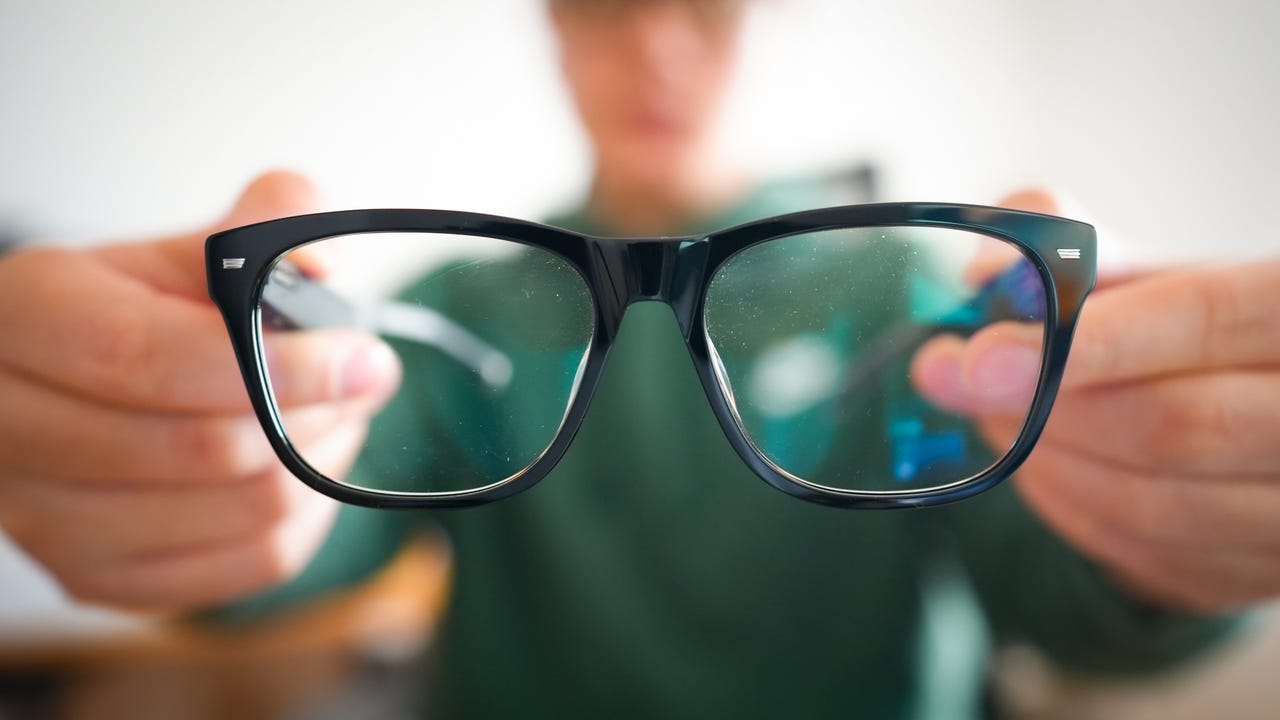
































The headline for this article could've gone many ways --I wore Amazon's Echo Frames at an airport and the TSA didn't stop meor These smart glasses let me take calls at CES hands-free -- but I settled with "Alexa on my face" because that's the use case most people will likely have for the latest smart glasses from Amazon. It's not as weird as it sounds, I promise.
Also: Alexa just got three new generative AI skills - here's how to try them
With these being the company's third generation of Echo Frames, Amazon's made mostly iterative updates -- the build is lighter, the battery lasts longer, and there's supposedly more bass -- while staying true to the glasses' original purpose: Giving you a direct (and natural) communication path with Amazon's popular voice assistant, Alexa.
You can do other things with the glasses too, of course, as I'll detail in my two-week account of wearing the Echo Frames below.
Smart audio glasses that come with lens options for blue light filtering, prescriptions, and shades.
In the hierarchy of smart glasses, you can think of the Echo Frames as the entry-level pair, ideal for users who want something discrete but with just enough technology to scratch that consumer itch. I've worn a few too many pairs of smart glasses over the past year, and these from Amazon may be the most normal-looking of them all. That's a good thing, as I learned during my flight to CES in early January.
Also: Amazon unveils way to cast video to Fire TV and Echo Show 15
Wanting to test both the Echo Frames and theMeta Ray-Ban during my trip, I went through the usual security screenings and found myself stopped twice because my camera-equipped Meta glasses looked suspicious. No one questioned the Echo Frames, which, even from up close, look like a regular pair of plastic-made prescriptions. (Or maybe no one expected me to havetwopairs of smart glasses. I'm not sure.)
The Meta Ray-Ban (left) has a built-in camera and is noticeably thicker and heavier than the Amazon Echo Frames (right).
True to Amazon's word, the Echo Frames feel very light on the face, with most of the weight distributed to the sides of the frames, where the speakers, buttons, and other minuscule components are stored. The rubberized tips on the ends of the glasses certainly help with the fit, though I've found it harder to fold the glasses after adjusting them.
While the glasses are easily stored in the included carrying case, if they're not folded properly, issues arise when you need to charge them. Because, unlike the Meta Ray-Ban's USB-C carrying case, there's a new separate charging dock for the Echo Frames, and aligning the wireless charging coils with the ones on the glasses can be quite the doozy. You either have to force the glasses into the gap -- which feels like something you wouldn't want to do with glasses -- or collapse and slot them in just right. Nine times out of 10, I'm doing option one.
In terms of functionality, the Echo Frames don't have multimodal AI cameras built into them like the Meta Ray-Ban or project visual overlays like XR glasses. Instead, they can stream Bluetooth audio, take calls and send text messages, read notifications, and communicate with Alexa-supported smart home devices like how your phone or smart hub normally would. Again, entry-level glasses -- and that's not a bad thing.
Also: Meta's$299 Ray-Ban smart glasses may be the most useful gadget I've tested all year
While my house is not as smartas my colleague Maria Diaz's, I enjoyed using the Echo Frames to turn on and off various smart switches, which saved me from having to walk over to my phone and use an app when it's charging in the kitchen or on my nightstand. The scale of Alexa-compatible devices is large enough that I could make commands to secure my three-year-old August entry lock, too.
The same "Alexa" wake word is used for commands.
Besides the smart features, I've also enjoyed listening to podcasts and making calls during my evening walks. Perhaps it's the ability to listen to my on-device audio while staying aware of my surroundings, or the fact that the speakers on the Echo Frames favor the mid and high frequencies more than the bassy, engulfing lows. It's probably a bit of both. The takeaway is that the glasses are great for vocal-only audio tracks and passable for anything multi-layered.
Also: 10 reasons the Apple Vision Pro is secretly brilliant
Lastly, I wish the button navigations weren't so complicated, but since I'm mainly using voice commands to get things done, the need to press the front or back button to accept and decline things (or mute the microphone) didn't bother me all that much. If you're coming from an older pair of Echo Frames, you'll have to retrain your muscle memory as the touch strip and swipe gestures are no more.
At a starting price of$269, theEcho Frames (3rd Gen) aren't necessarily priced to compete. They're just$30 less than Meta's more capable Ray-Ban smart glasses .
But there are two big things that Amazon's glasses have going for them: Alexa integration and design. Smart home enthusiasts will absolutely reap the benefits of having a controller that they can use at all times (with a battery life that can last them all day), and first-time smart glasses shoppers will find these much less intimidating than the ones with mini projectors and cameras built in. Plus, you'll have a smaller chance of being stopped by the TSA.
 Hot Tags :
Tech
Wearables
Hot Tags :
Tech
Wearables